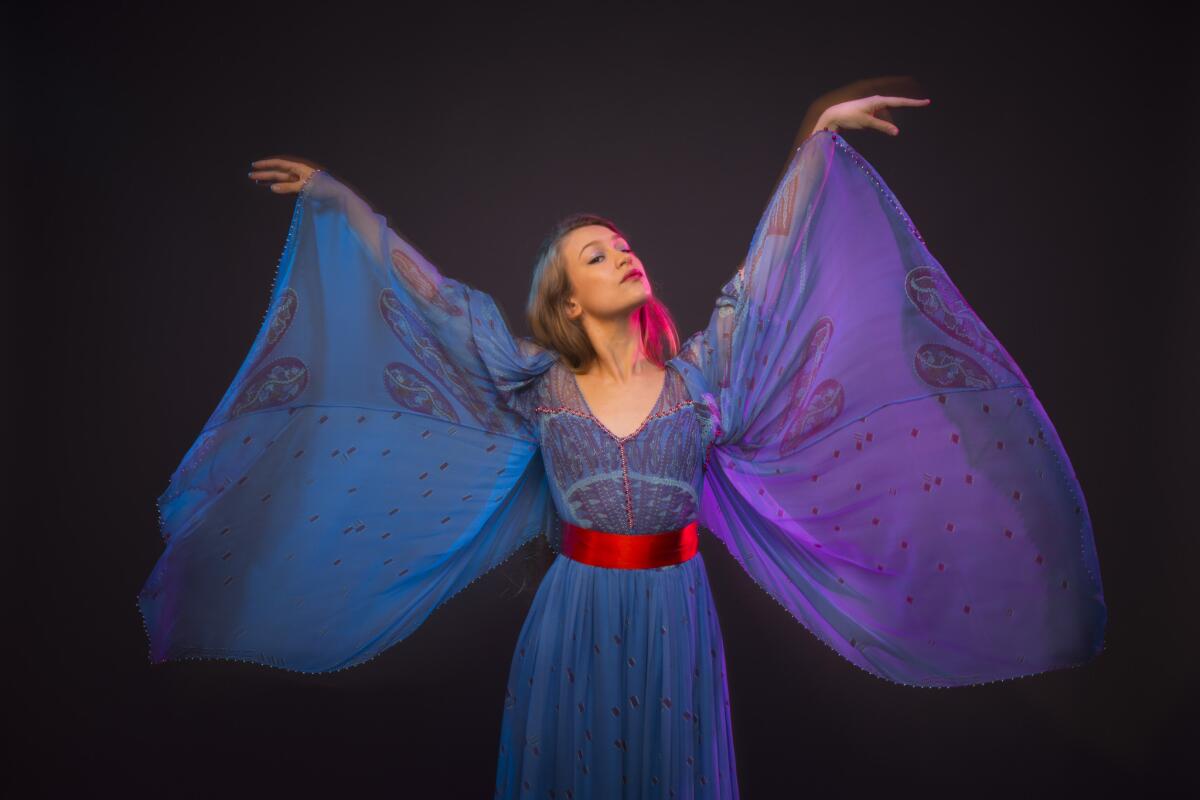Joanna Newsom on plunging deep into history for ‘Divers,’ her first new album in five years

Harpist and singer-songwriter Joanna Newsom is photographed in advance of her new album, “Divers,” in the Los Angeles Times studio in downtown Los Angeles.
Joanna Newsom will issue her fourth album, “Divers,” on Friday, and since releasing her previous one in 2010 she’s experienced a series of life changes.
Five years ago, she’d already collaborated with Van Dyke Parks and performed at Walt Disney Concert Hall but had yet to appear as narrator and actress in Paul Thomas Anderson’s film “Inherent Vice.” She’d jumped homes from Nevada City, Calif., to New York City, where she drew inspiration for “Divers” from the city’s kaleidoscopic back story.
Newsom recently relocated to Los Angeles to make a home with her husband, comic actor Andy Samberg, reportedly at a place called Moorcrest. A grandly peculiar, mosaic-filled home in Hollywood Hills, its former occupants include movie star Mary Astor and actor-director Charlie Chaplin.
SIGN UP for the free Classic Hollywood newsletter >>
She spent four years working on “Divers,” a work so lyrical and precisely rendered that Hollywood obligations and a Disney-esque mansion seem like passing concerns. Carrying its own cinematic grandeur, the album’s 11 songs feature characters both historic and fictional, including Private Poorwill, King Tamanend and a military brigade called the 101st Lightborne Elite. The footnotable references and labyrinthine lines are presented in a package in which every syllable is sacred, each note filled with a sense of the possible. Focused listening is rewarded.
She described the setting of “Divers” as a “a place where history and humanity is concentrated and layered.” It sounds like the city but jumps through time and space.
A harp and a voice
Combined, said Newsom, the overarching set of connections that built “Divers” asserted itself not long after she started writing for the album. “I started realizing that I was returning to the same collection of ideas over and over again, narratively, and I was approaching them in different ways,” she said over lunch near Fountain Avenue and L. Ron Hubbard Drive.
“This song, I might be approaching the set of ideas in a fantastical way, and in that song, I might be approaching them in a very straightforward way. This one I might be approaching them from a first-person or autobiographical perspective, and this song I might be approaching them from a much more sort of zoomed-out, almost disembodied, omniscient narrative perspective.
“I started to feel that all the songs were connected in that way,” she added. “Almost that they were all asking the same question.”
At the musical center of “Divers” are Newsom’s primary instruments, the harp and her soaring voice, which are augmented at various times with electric guitar, piano, drum kit, bouzouki, trombone, violin, musical saw or, in the case of “Time, As a Symptom,” the City of Prague Philharmonic Orchestra. Newsom expanded her own instrumentation to include the clavichord, harpsichord and Mellotron. In a new twist, she also added classic synthesizers and immersed herself with engineer Noah Georgeson in the art of mixing the album’s many frequencies into a sonically cohesive whole. It was recorded by Georgeson and Steve Albini.
“I think I had the sense that this was an album that was going to become itself in the mix — that there were so many disparate elements and strange sort of piles of options that had accumulated, not all of which would have ended up being useful,” she said.
This whirlwind of creative curiosity is partially what drew the contemporary composer-arranger Nico Muhly to collaborate with Newsom on the album’s first song, called “Anecdotes.” Noting what he called her fearlessness, Muhly (best known to the general public for his work on films including “Margaret” and “The Reader”) described Newsom in an email as “a mistress of structure and of governing time; the listener feels on a journey with a responsible guide.”
David Longstreth, best known for founding the avant-pop band Dirty Projectors, contributed orchestral arrangement to “Time, As a Sympton,” the album’s coda. Writing via email on the process of collaboration, he said: “Musically, she knew more or less exactly what she wanted in every measure of the song. So there was a fair amount of back-and-forth just making sure we got it to how she was hearing it. I haven’t done a ton of stuff as an arranger for other peoples’ music — I wanted to do this because she is one of my favorite songwriters — so it was a new and unique process for me.”
Such precision is obvious throughout, but notably on the second song on “Divers,” called “Sapokanikan,” the original name for what is now Greenwich Village.
Joanna Newsom calls Spotify “a villainous cabal” and “a garbage system”
Musically, the piece mixes Brecht with the Baroque, hinting at “Hejira”-era Joni Mitchell. Opening with a gentle, timeless tangle of piano and snare drum, the song defiantly avoids the contemporary, dotting through decades with each measure as lyrics reference Tammany Hall, hunters of the future and a mysterious woman named Florry Walker. It approaches bombast but retreats, moves into a drunken waltz and spins in circles as Newsom harmonizes with herself before finishing in a different musical environment entirely after just over five minutes. It’s all very studied and cosmopolitan, which makes sense.
“New York was useful as sort of a case study for some of the things that I wanted to talk about,” said Newsom. “There’s a lot of binary stuff on the record — pulling.” She describes what she called “obvious boldface” themes like “time, space, life, death, but a lot of the songs are occupying or trying to cross the border between those two opposing forces, and I feel like the idea of the city, which in some songs is named — New York — and in others songs is not named, is sort of a character.”
‘Weird and genius’
Newsom, 33, sublimely articulate about her tastes and approaches, was born and raised in Nevada City, one of three children in a family whose distant relation is Lt. Gov. Gavin Newsom. She knew she wanted to be a professional musician at an early age and gravitated toward the most unwieldy of instruments, the harp, while also studying piano. After studying composition at Mills College in Northern California and recording two early EPs, the artist signed to the respected Chicago label Drag City, which over the years has been home to iconoclastic artists including Will Oldham, Jennifer Herrema and Pavement. Her 2004 first album, “The Milk-Eyed Mender,” marked the arrival of a similarly inventive and equally uncommercial voice.
Longstreth said he first heard Newsom’s music when a friend burned him a copy of early versions of songs that became “The Milk-Eyed Mender.”
“I was in college, living in this weird house off-campus with some friends, and we blasted it a lot in that house,” said Longstreth. “The melodies, the stories, the rhymes, the chord progressions: she was speaking our language for sure. I think it was one of the reasons I left school the next semester. I was like, “[what] am I doing here if someone is already out there making music like this, on this level??”
He added that he and Dirty Projectors member Amber Coffman absorbed “Ys” during a 2006 journey through the Southwest. “Amber and I were driving a Dodge Caravan full of gear across the west Texas desert, and I remember the two of us listening to it over and over for two nights, no one else out on the highway and the stars just impossibly big.”
It was around this time that Muhly first saw Newsom perform, at the Bowery Ballroom in New York. “My roommate and I had arrived early, and Joanna wheeled her harp out and started singing ‘Bridges and Balloons,’” he recalled. “We were mesmerized and basically dumbstruck about how great and weird and genius the whole thing was.”
Detractors tend to focus more on that weirdness. Those looking for Beatles-esque verse-chorus-verse resolution, for example, are in for some trouble. Her lyrics seem written not only to be sung but also to work on the page, and she’s more than willing to sacrifice singalong ease for expository conceits. Lines are stitched together with an expert’s hand, then brought to life through a confident voice that can reach and hold notes one moment and squawk the next.
Newsom moved further from pop structures on her second album, “Ys,” an angular, challenging work produced and arranged in collaboration with Parks that confirmed her promise. Its success carried her away from smoky clubs into concert halls, including a memorable performance at Disney Hall in 2007.
“Divers” is no less challenging than either “Ys” or 2010’s “Have One on Me.” But it is, said Newsom, the most thematically linked album she’s done, even if narrative strands are hardly chronological. Rather, Newsom describes the work as “a sort of narrative loop.”
“Each song is running a leg of the relay and then passing the baton to the next song, but they’re all ultimately circumnavigating something.”
Unlocking the album’s secrets, like all of Newsom’s work, requires intentional listening. She returns, though, to the notion of time, the ways in which it interacts with a plot of land and the people who inhabit it. In typically descriptive language she calls these souls “stuck together and squashed together, living and dying and making noise and smelling weird and falling in love, creating beauty and fighting with each other and all that. It’s so saturated there.”
The same could be said for the immersive “Divers.”
More to Read
The biggest entertainment stories
Get our big stories about Hollywood, film, television, music, arts, culture and more right in your inbox as soon as they publish.
You may occasionally receive promotional content from the Los Angeles Times.











